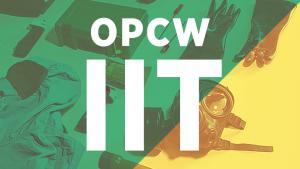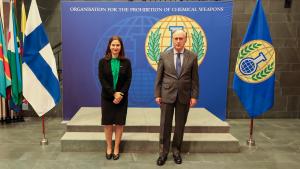Mandate
The mandate of the OPCW Investigation and Identification Team (IIT) is to identify the perpetrators of specific instances of chemical weapons use in the Syrian Arab Republic.
The IIT is responsible for investigating only those instances in which the Fact-Finding Mission (FFM) has determined that use or likely use of chemical weapons in Syria has occurred, as well as cases for which the now expired OPCW-United Nations Joint Investigative Mechanism (JIM) did not issue a report.
The IIT is tasked with fact finding and is not a prosecutorial or judicial entity. It is not responsible to determine criminal responsibility of individuals, organisations or States. Furthermore, the IIT does not make recommendations for future action. These issues pertain to the policy-making organs of the OPCW (i.e. the Conference of States Parties, Executive Council) and other bodies.
Establishment and composition
The IIT was established based on the decision of the Conference of States Parties titled Addressing the Threat from Chemical Weapons Use (C-SS-4/DEC.3) dated 27 June 2018. The IIT is part of the OPCW Technical Secretariat and functions under the authority of the OPCW Director-General. It works under a Coordinator, appointed by the OPCW Director-General, and consists of investigators and analysts with relevant qualifications and experience in complex investigations, analysis and forensics. The team also includes an expert in information systems and a legal advisor. Other Technical Secretariat staff and external experts provide further support.
Key findings
To date, the IIT has identified the Syrian Arab Republic’s armed forces as perpetrators in the following cases of chemical weapons use in Syria:
Methodology
The IIT’s findings are impartial and based on scientific evidence.
The IIT investigates and reports on all information potentially relevant to the origin and use of chemical weapons. This includes, but is not limited to:
- analysing information received from the FFM, provided by States parties and organisations;
- analysing information from affected persons;
- analysis of environmental and biomedical samples;
- assessments from forensic institutions;
- conducting interviews with witnesses;
- analysing meteorological data and satellite images;
- conducting ballistics analysis, analysis of munition remnants, toxicology analysis, as well as other relevant data from open sources.
The IIT experts analyse physical evidence collected by the FFM or by third parties. Third party samples are submitted with detailed documentation on how the sample was collected and the chain of custody. The IIT checks and verifies the authenticity of the submitted documentation. Samples are sent for analysis to OPCW Designated Laboratories around the globe which operate completely independently from each other to ensure impartial and scientifically sound results on the basis of established practices and procedures.
The IIT standard of proof is ‘reasonable grounds’ to suspect that an individual or entity was directly or indirectly involved in the use of a chemical weapon. This is the standard applied by international fact-finding missions and commissions of enquiry to reach conclusions. The information gathered and analysed is considered holistically.
The IIT provides regular reports on its investigations and findings to the OPCW Executive Council and to the UN Secretary-General.
The IIT is further required to preserve and provide information to the investigation mechanism established by the United Nations General Assembly in Resolution 71/248 (2016) [International, Impartial and Independent Mechanism to Assist in the Investigation and Prosecution of Persons Responsible for the Most Serious Crimes under International Law Committed in the Syrian Arab Republic since March 2011 (IIIM)], as well as to any relevant investigatory entities established under the auspices of the United Nations.
News
More News- OPCW identifies ISIL as perpetrators of 2015 chemical attack in Marea, Syria IIT report concludes ISIL held exclusive means, motives, and capabilities to deploy sulfur mustard in 2015 attack
- OPCW Director-General meets UN High Representative for Disarmament Affairs The discussion focused on global disarmament and non-proliferation issues
- OPCW Director-General meets Finland’s State Secretary to the Minister for Foreign Affairs The high-level discussion focused on OPCW’s role in strengthening the implementation of the Convention and in achieving a common vision for countering the re-emergence of chemical weapons
IIT Reports
First Report of the IIT
Dated 8 April 2020
The first report by the OPCW Investigation and Identification Team focuses on the incidents in Ltamenah, Syrian Arab Republic on 24, 25, and 30 March 2017.
Report and Statements
S/1867/2020 – First Report by the OPCW Investigation and Identification Team (IIT) Pursuant to Paragraph 10 of Decision C-SS-4/Dec.3 “Addressing the Threat From Chemical Weapons Use” Ltamenah (Syrian Arab Republic) 24, 25, and 30 March 2017 | العربية | 中文 | Français | Русски | Español
National Statements
Second Report of the IIT
Dated 12 April 2021
The second report of the IIT sets out the findings of the investigations conducted in the period between April 2020 and March 2021, focusing on the incident in Saraqib, the Syrian Arab Republic, on 4 February 2018.
Report and Statements
S/1943/2021 – Note by the Technical Secretariat: Second Report by the OPCW Investigation and Identification Team Pursuant to Paragraph 10 of Decision C-SS-4/DEC.3 “Addressing the Threat from Chemical Weapons Use” Saraqib (Syrian Arab Republic) – 4 February 2018 | العربية | 中文 | Français | Русски | Español
Third Report of the IIT
Dated 27 January 2023
The third report of the IIT sets out the findings of the investigations conducted in the period between January 2021 and December 2022, focusing on the incident in Douma, the Syrian Arab Republic, on 7 April 2018.
Reports and Statements
S/2125/2023 – Note by the Technical Secretariat: Third Report by the OPCW Investigation and Identification Team Pursuant to Paragraph 10 of Decision C-SS-4/DEC.3 “Addressing the Threat from Chemical Weapons Use”, Douma (Syrian Arab Republic) – 7 April 2018 | العربية | 中文 | Français | Русски | Español
Fourth Report of the IIT
Dated 22 February 2024
The fourth report of the IIT sets out the findings of the investigation conducted in the period between January 2023 and February 2024, focusing on the incident in Marea (Aleppo Governorate), the Syrian Arab Republic, on 1 September 2015.



